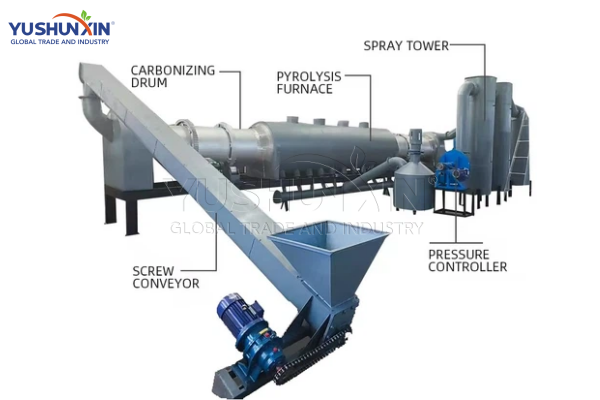Introduction
In the quest for sustainable and efficient methods to produce charcoal, the continuous carbonization machine stands out as an innovative solution. This advanced technology offers several advantages over traditional batch carbonization methods, making it an increasingly popular choice for both small-scale producers and industrial operations. This passage explores the reasons for choosing a continuous carbonization machine for charcoal production, highlighting its benefits in efficiency, environmental impact, and product quality.

Enhanced Efficiency and Productivity
One of the primary reasons for choosing a continuous carbonization machine is its enhanced efficiency and productivity. Unlike batch carbonization, which processes a set amount of biomass in discrete cycles, a continuous system operates non-stop. This capability allows for the consistent conversion of biomass into charcoal, significantly increasing output rates. Producers can achieve higher volumes of charcoal without the downtime associated with loading and unloading kilns in batch processes.
Moreover, continuous carbonization machines are designed with automated feeding and discharge systems, which streamline operations and reduce labor requirements. This automation not only speeds up the production process but also lowers operational costs, making it an economically attractive option for producers.
Improved Environmental Impact
Continuous carbonization machines also offer significant environmental benefits. Traditional charcoal production methods often result in substantial emissions of greenhouse gases and pollutants due to incomplete combustion and inefficient energy use. In contrast, continuous systems are engineered to optimize the carbonization process, ensuring more complete combustion and reducing harmful emissions.
Additionally, these machines often include advanced emission control technologies, such as gas scrubbing and heat recovery systems. These features help minimize the environmental footprint of charcoal production by capturing and reusing by-products like syngas, which can be employed to generate heat or electricity for the process itself, enhancing overall energy efficiency.
Superior Product Quality
The quality of charcoal produced using continuous carbonization machines is another compelling reason for their adoption. These machines offer precise control over carbonization parameters such as temperature and residence time, which are critical to producing high-quality charcoal with desirable properties like high calorific value and low ash content.
Consistent temperature control and uniform heat distribution result in charcoal that is more homogenous, with fewer impurities and better burning characteristics. This quality consistency is particularly important for commercial applications where product reliability and performance are key factors.
Economic and Strategic Considerations
Investing in a continuous carbonization machine involves careful economic and strategic planning. While the initial investment may be higher than that for traditional kilns, the long-term benefits of increased efficiency, reduced labor costs, and higher quality output can yield a significant return on investment.
Strategically, adopting continuous carbonization technology positions producers to meet evolving market demands for sustainable and environmentally friendly products. It also aligns with global trends toward cleaner production methods and sustainable resource management.
Conclusion
The choice to use a continuous carbonization machine for charcoal production is driven by its numerous advantages in efficiency, environmental sustainability, and product quality. By investing in this technology, producers can enhance their operational capabilities, reduce their ecological footprint, and deliver high-quality charcoal to meet market needs. As the world continues to prioritize sustainable practices, continuous carbonization machines represent a forward-thinking solution for modern charcoal production. Visiting: https://www.ysxcharpro.com/product/continuous-carbonization-furnace/
Leave a Reply